
Hướng dẫn học tiếng Anh 8 Unit 9: Natural Disasters
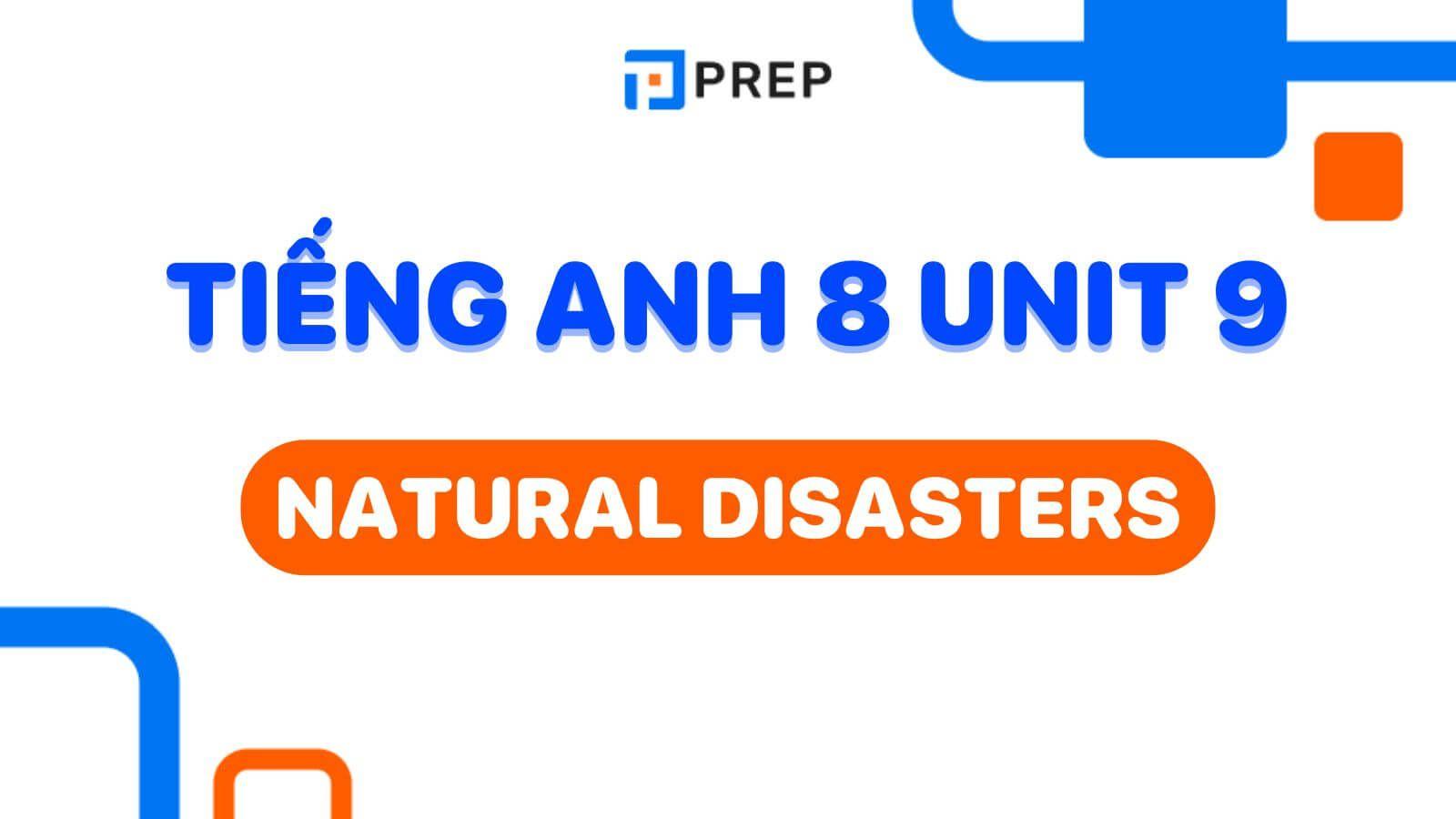
I. Giới thiệu về Unit 9 tiếng Anh 8
Trong Unit 9 của sách giáo khoa tiếng Anh 8, học sinh sẽ được học và ôn luyện những kiến thức, kỹ năng sau:
Tham khảo thêm bài viết:
-
Tiếng Anh 8 Unit 7: Environmental Protection - Global Success
-
Tiếng Anh 8 Unit 8: Shopping - Global Success
-
Tiếng Anh 8 Review 3 | Language và Skills
II. Từ vựng, ngữ pháp, phát âm trọng tâm trong tiếng Anh 8 Unit 9
Cùng PREP điểm qua kiến thức về từ vựng, ngữ pháp, phát âm trọng tâm trong sách tiếng Anh 8 Unit 9 dưới đây nhé!
1. Từ vựng
2. Ngữ pháp
Thì quá khứ tiếp diễn (past continuous tense) dùng để diễn tả một hành động đang diễn ra tại một thời điểm cụ thể trong quá khứ hoặc hai hành động đang diễn ra đồng thời trong quá khứ. Ví dụ:
-
Anna was eating dinner when the lights went out. (Anna đang ăn tối thì đèn tắt.)
-
I was working hard at 8 pm yesterday. (Tôi đang làm việc chăm chỉ lúc 8 giờ tối hôm qua.)
Tìm hiểu thêm kiến thức về thì tiếp diễn qua bài viết “Thì quá khứ tiếp diễn (Past continuous tense) trong tiếng Anh!” dưới đây bạn nhé!
3. Phát âm
3.1. Từ kết thúc bằng "-al"
Các từ kết thúc bằng "-al" thường là tính từ tiếng Anh và có trọng âm rơi vào âm tiết trước "-al". Ví dụ:
-
Personal /ˈpɜː.sən.əl/: Trọng âm rơi vào âm tiết đầu "per".
-
Political /pəˈlɪt.ɪ.kəl/: Trọng âm rơi vào âm tiết thứ hai "lit".
-
Critical /ˈkrɪt.ɪ.kəl/: Trọng âm rơi vào âm tiết đầu "crit".
3.2. Từ kết thúc bằng "-ous"
Các từ kết thúc bằng "-ous" cũng thường là tính từ, và trọng âm của chúng cũng thường rơi vào âm tiết ngay trước "-ous".
Ví dụ:
-
Dangerous /ˈdeɪn.dʒər.əs/: Trọng âm rơi vào âm tiết đầu "dan".
-
Famous /ˈfeɪ.məs/: Trọng âm rơi vào âm tiết đầu "fam".
-
Generous /ˈdʒen.ər.əs/: Trọng âm rơi vào âm tiết đầu "gen".
III. Cấu trúc bài học Unit 9 tiếng Anh 8
Cùng PREP điểm qua kiến thức về từ vựng, ngữ pháp, phát âm trọng tâm trong sách tiếng Anh 8 Unit 9 dưới đây nhé!
1. Tiếng Anh 8 Unit 9 Getting started
1.1. Listen and read
Nghe và đọc:
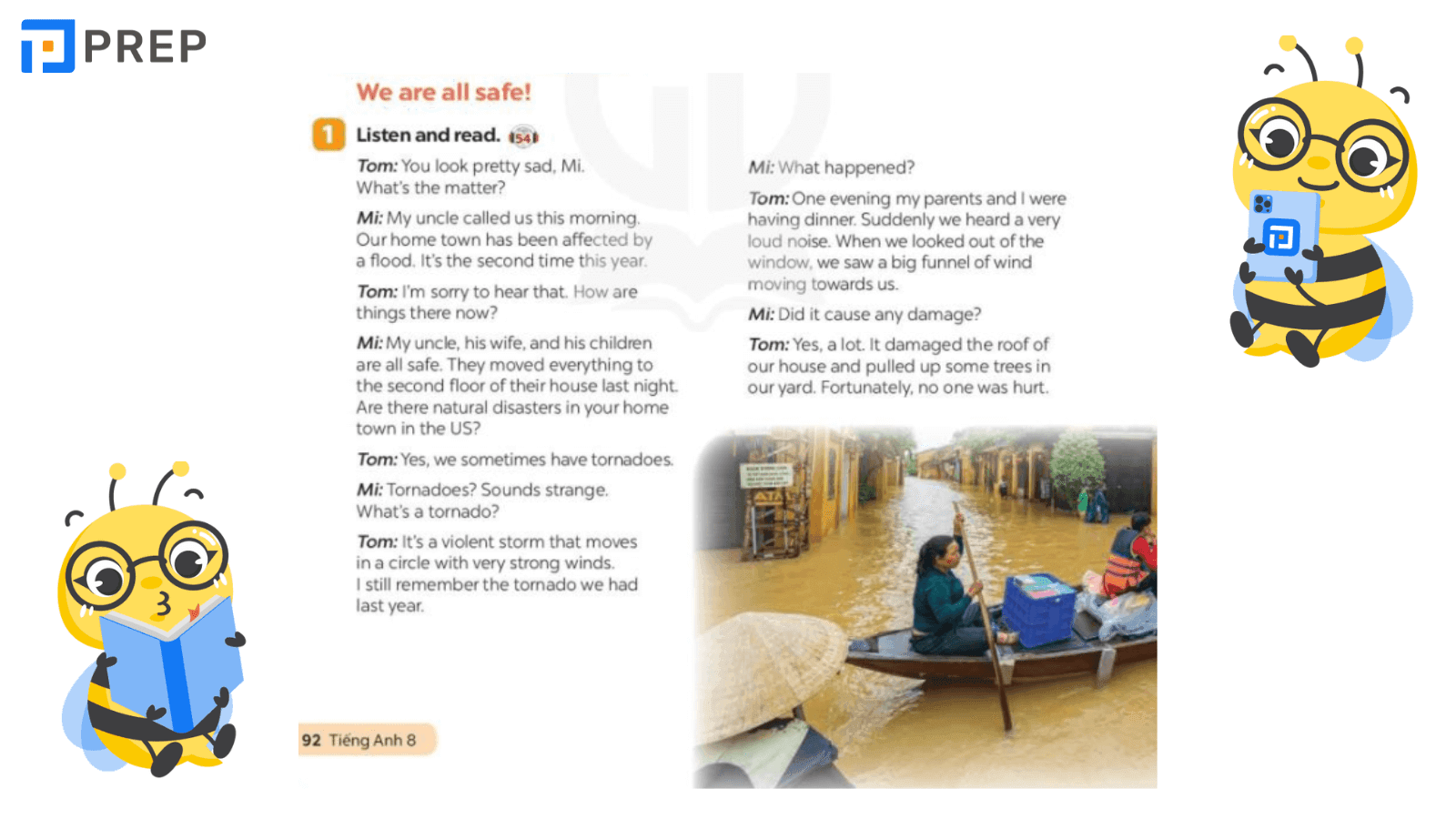
1.2. Read the conversation again
Đọc đoạn hội thoại một lần nữa. Hoàn thành mỗi câu với không quá HAI từ từ nó:
1. There is a _______________ in Mi's hometown.
2. Her uncle’s family had to move everything to the _______________ last night.
3. A tornado is an example of a _______________.
4. Tom’s family _______________ dinner when the tornado came.
5. The tornado damaged their roof and _______________ up some trees in their yard.
1.3. Write the natural disasters from the box under the pictures
Viết các thảm họa thiên nhiên từ hộp dưới hình ảnh. Sau đó nghe, kiểm tra và lặp lại:
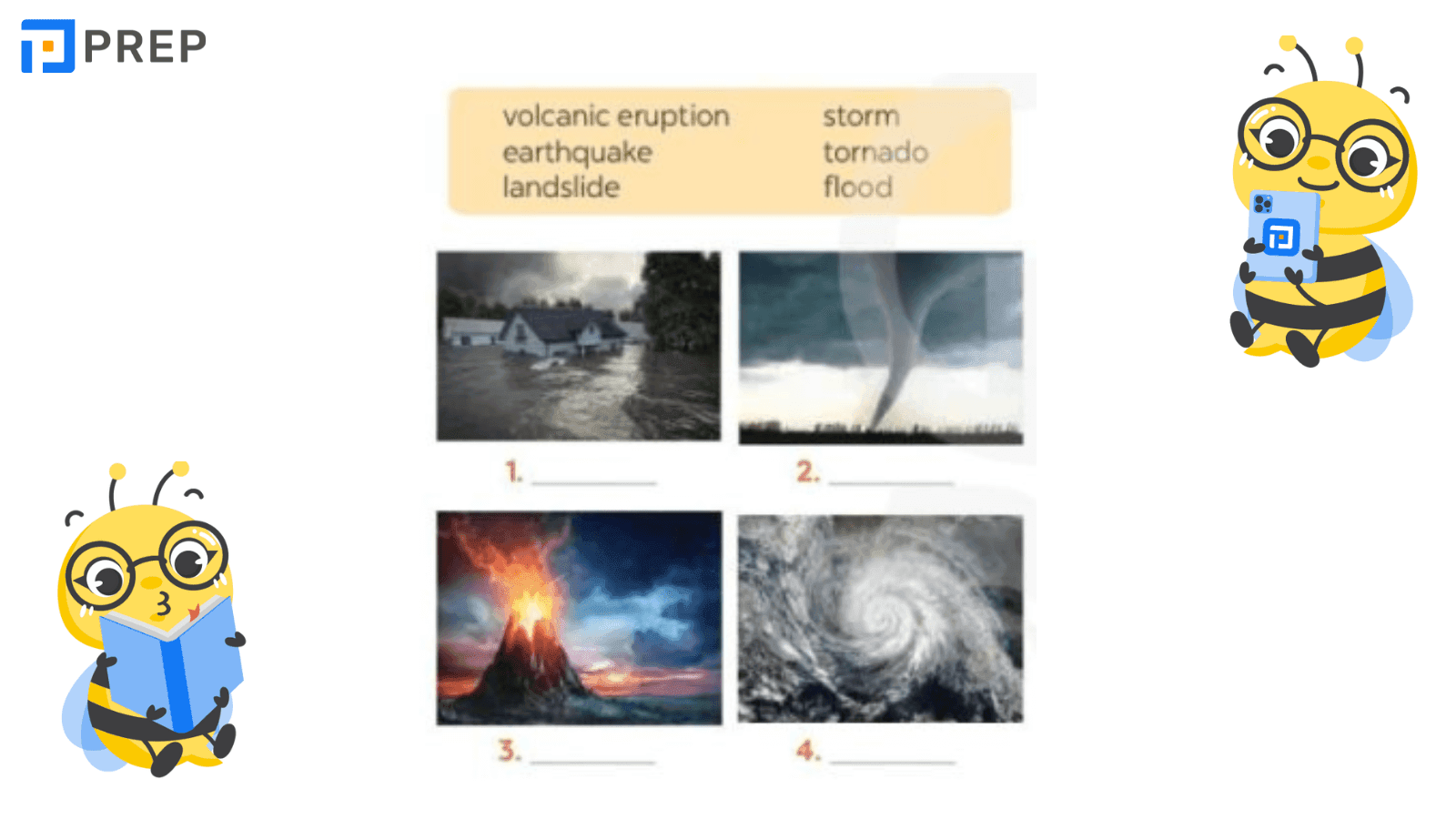
1.4. Choose the correct option to complete each sentence
Chọn phương án đúng để hoàn thành mỗi câu:
1. When there is a(n) earthquake / volcanic eruption, hot gases and liquid rock pour out from a mountain.
2. Oh, the house is shaking! I think we're having a(n) earthquake / flood.
3. We wanted to travel to Ha Giang, but there was a tornado / landslide. Some big rocks and mud came down the mountains.
4. Every year more than ten floods / storms with strong winds and rain cause damage in our country.
5. A tornado / storm looks like a huge funnel and causes a lot of damage. Its strong winds can reach 480 km per hour.
1.5. Word web. Work in groups
Làm việc nhóm. Hoàn thành trang web với tất cả các từ và cụm từ liên quan đến thảm họa thiên nhiên mà bạn biết.
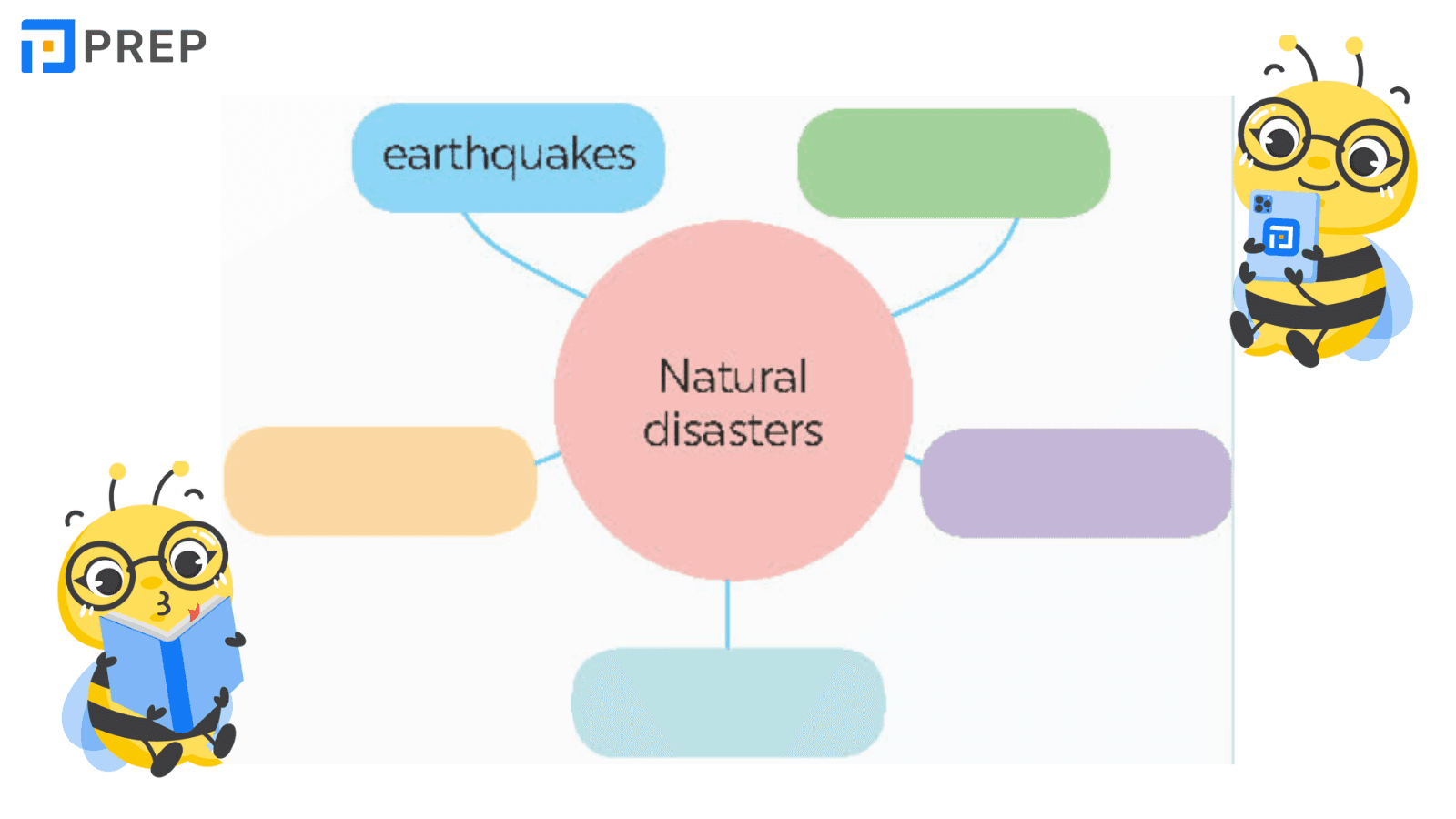
2. Tiếng Anh 8 Unit 9 A Closer Look 1
2.1. In column B, write the noun forms of the verbs in column A
Ở cột B, viết dạng danh từ của động từ ở cột A.
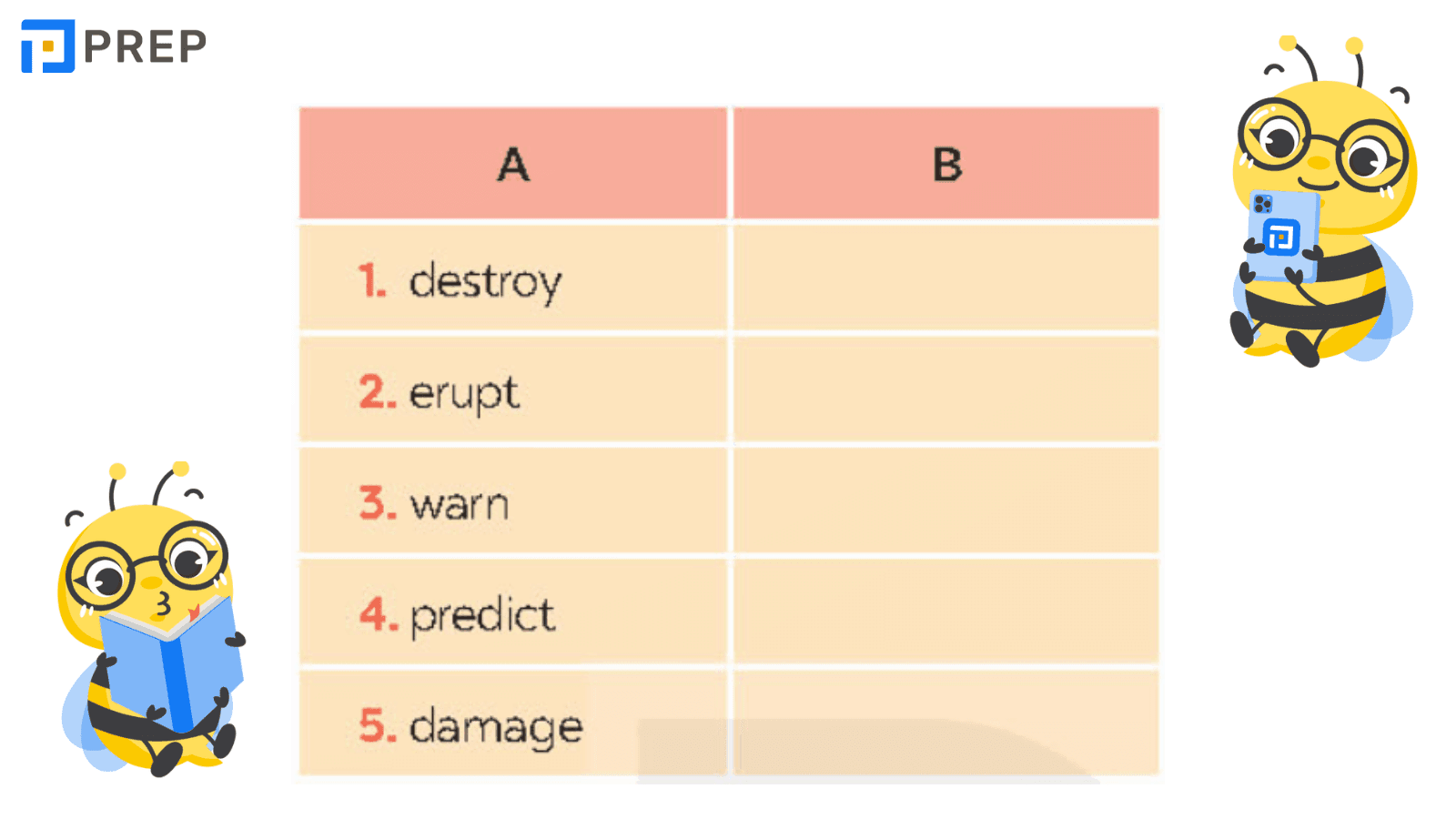
2.2. Write a word or phrase from the box under the correct picture
Viết một từ hoặc cụm từ từ hộp dưới hình ảnh đúng:
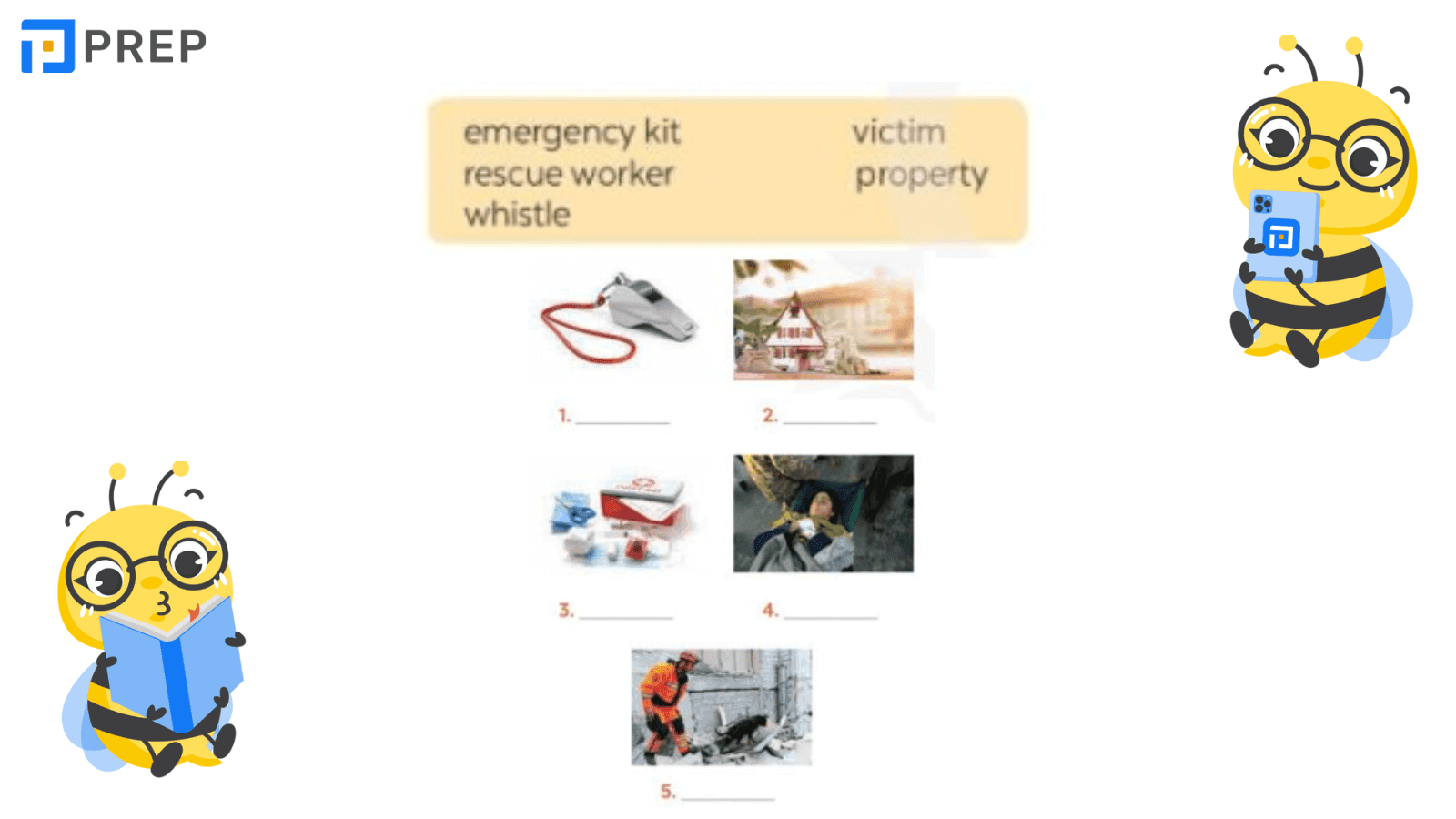
2.3. Fill in each blank with a word or phrase from the box
Điền vào mỗi chỗ trống với một từ hoặc cụm từ trong hộp:
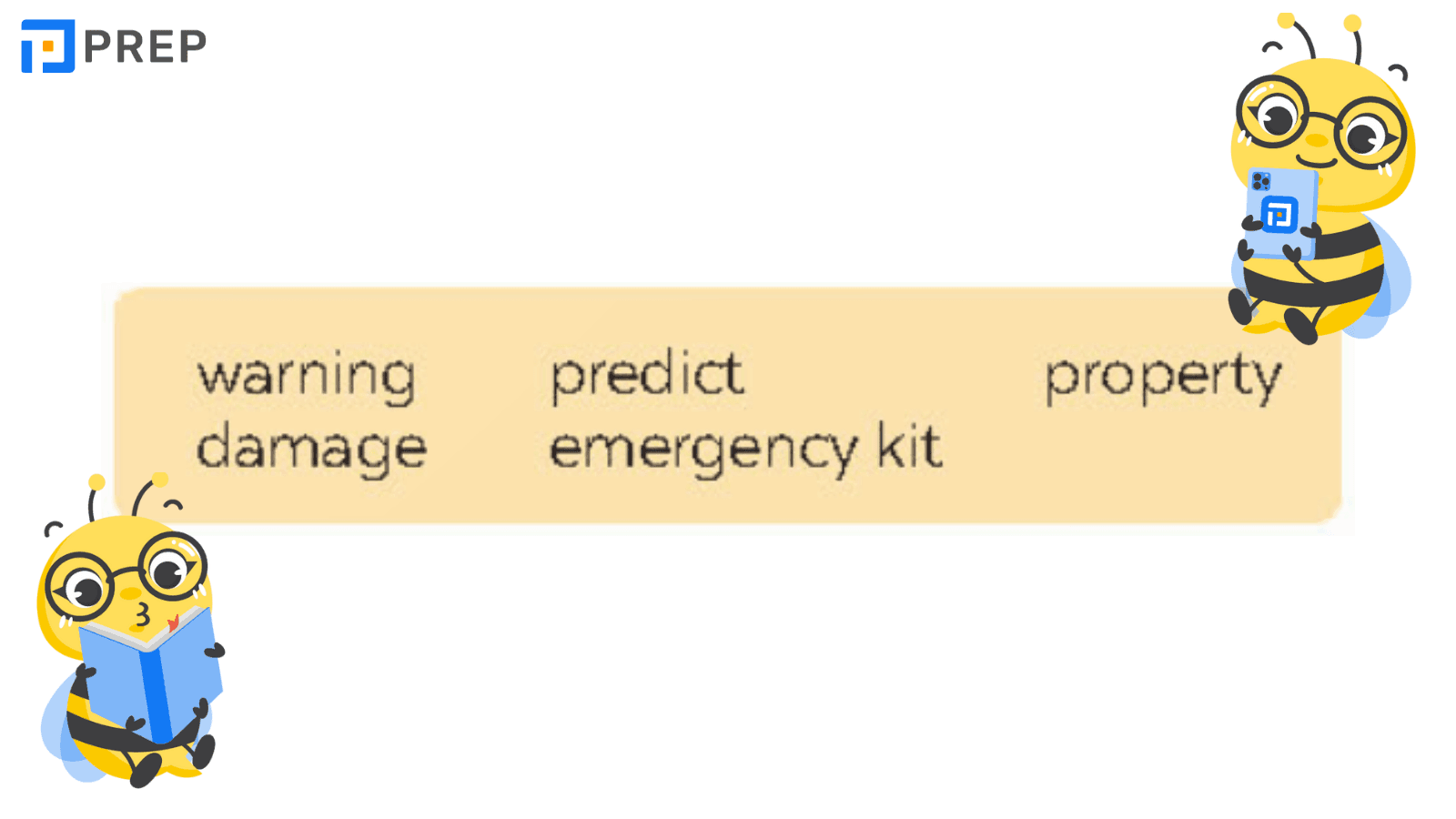
1. Natural disasters can cause serious _________ to human life.
2. Local authorities gave a flood _______ yesterday, so today people are moving to safer places
3. To prepare for a natural disaster, we should make a(n) _________.
4. It’s hard to believe that we cannot _________ when earthquakes will happen.
5. They lost all of their _________ because of the volcanic eruption.
2.4. Listen and repeat the words
Nghe và lặp lại các từ. Chú ý đến trọng âm của từ:
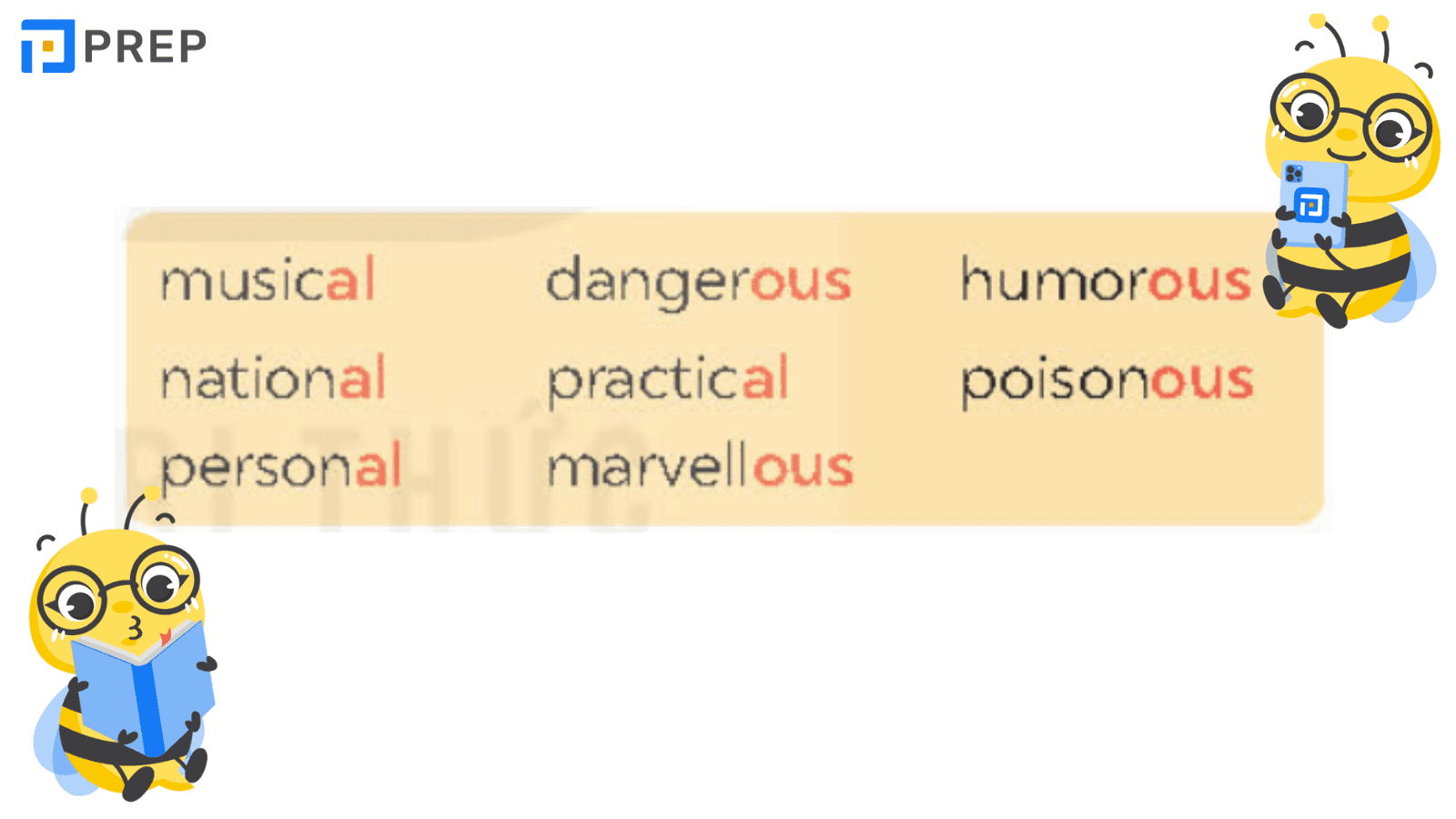
2.5. Listen and repeat the sentences
Nghe và lặp lại các câu. Đánh dấu trọng âm trong các từ được gạch chân:
1. The flood victims are collecting their personal property.
2. Avoid dangerous places, such as windows or bookcases, during an earthquake.
3. There are numerous tropical storms in this area every year.
4. Some natural disasters, such as landslides, usually happen in mountainous areas.
5. She gave us practical tips about treating poisonous waste.
3. Tiếng Anh 8 Unit 9 A Closer Look 2
3.1. Complete the sentences by putting the verbs in brackets into the past continuous
Hoàn thành câu bằng cách chia động từ trong ngoặc ở thì quá khứ tiếp diễn:
1. They (help) _________ the flood victims at 10 o'clock last night.
2. It (not snow) _________ when left home this afternoon.
3. While she (work) _________ the field, the tornado came.
4. - What _________ you (do) _________ at 9 o'clock yesterday morning? - I (watch) _________ the news about a volcanic eruption.
5. - _________ you (cry) _________ when I saw you two days ago? - No, I wasn't.
3.2. Circle the correct answer to complete each sentence
Khoanh tròn đáp án đúng để hoàn thành mỗi câu:
1. We donated / were donating money to help the earthquake victims last month.
2. - What did you do / were you doing when the volcano erupted? - I slept / was sleeping in my bed.
3. While they camped / were camping near the river, the flood was coming / came suddenly.
4. After Tom ran / was running out of his house, he moved / was moving quickly to a safer place.
5. I didn't read / wasn't reading a newspaper at 9 a.m. yesterday, but I watched / was watching the news about the tornado.
3.3. Look at the picture and write what each person in Lan’s family was doing when the earthquake happened. Use the given word and phrases from the box. (Nhìn vào bức tranh và viết những gì mọi người trong gia đình của Lan đã làm khi trận động đất xảy ra. Sử dụng từ và cụm từ đã cho trong hộp)

3.4. Form questions using the past continuous
Hình thành câu hỏi sử dụng thì quá khứ tiếp diễn. Sau đó theo cặp, hỏi và trả lời các câu hỏi:
1. you / have dinner / 7 o'clock yesterday evening?
2. you / do / homework / 8 o'clock yesterday evening?
3. you / watch / film / 9 o'clock yesterday evening?
3.5. Memory challenge
Thử thách trí nhớ. Làm việc nhóm. Thay phiên nhau nói một câu mô tả mỗi người trong tranh đang làm gì:
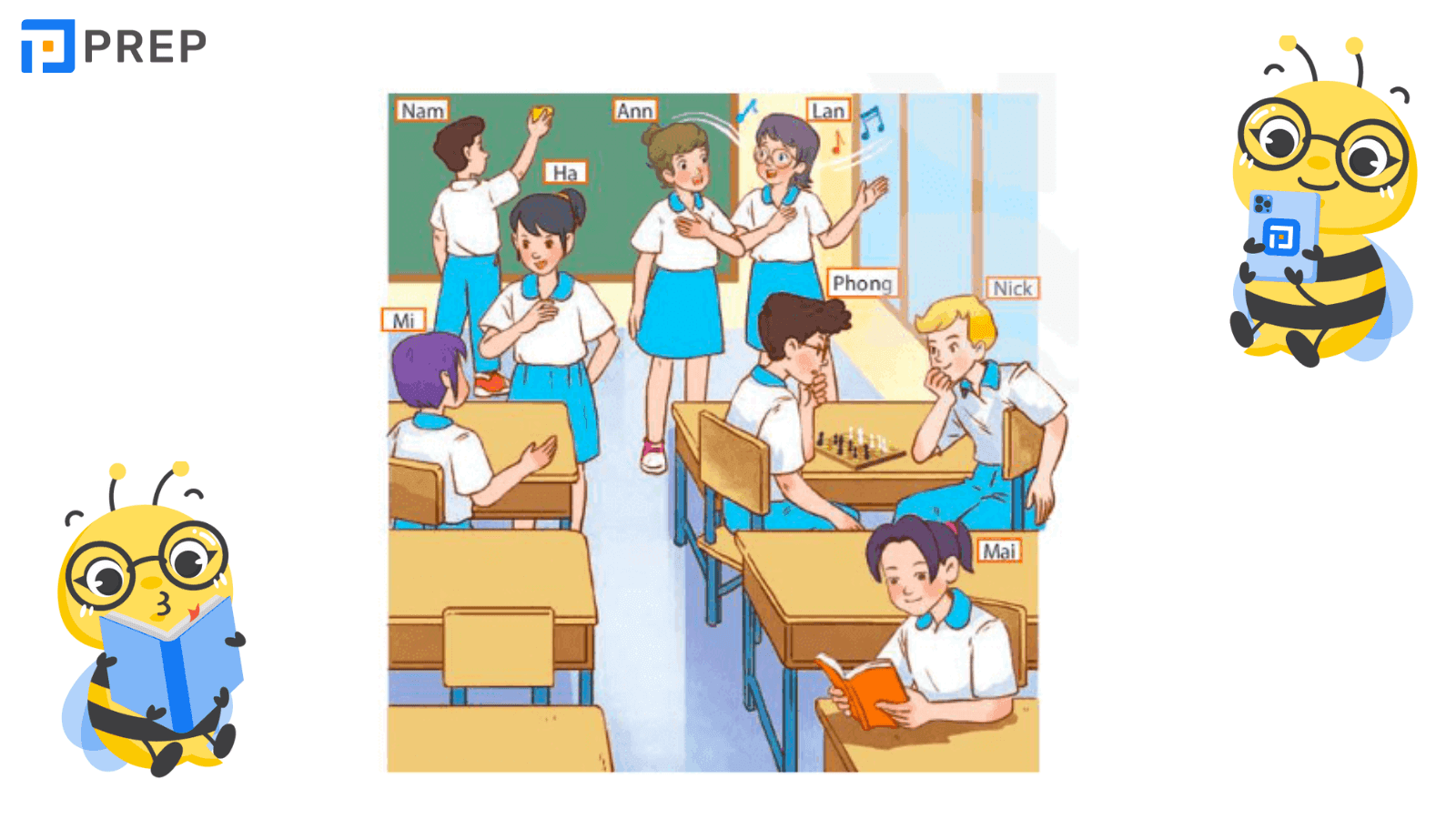
4. Tiếng Anh 8 Unit 9 Communication
4.1. Listen and read the dialogue below
Nghe và đọc đoạn hội thoại dưới đây. Chú ý những câu được đánh dấu:
-
Mark: Phong, why are you so sad?
-
Phong: My grandparents called this morning. A flood destroyed their house.
-
Mark: I'm sorry to hear that.
-
Phong: It also damaged all of their crops.
-
Mark: That’s awful. I hope your grandparents are safe.
4.2. Work in pairs
Làm việc theo cặp. Thực hành đưa ra và đáp lại tin xấu trong các tình huống sau:
-
You have a friend in a mountainous area. A landslide destroyed his family’s garden yesterday. You share this news with your classmate.
-
You hear that a big earthquake hit a city. You share this news with your classmate.
4.3. Read the short passages below
Đọc các đoạn văn ngắn dưới đây. Quyết định xem mỗi người dưới đây đang nói về thảm họa thiên nhiên nào:
-
Nam: We were travelling on the road near a mountain. Suddenly, a lot of rocks and mud came down the mountain.
-
Ann: While I was working in the garden, I saw a big funnel of wind moving towards us very quickly.
-
Tom: Suddenly, everything in our living room began to shake. My sister and I quickly hid under the table.
4.4. Choose the correct answer to each question to see how much you know about natural disasters
Chọn câu trả lời đúng cho mỗi câu hỏi để xem bạn biết bao nhiêu về thiên tai:
Question 1: Which of these may cause landslides?
-
A. Heavy rain.
-
B. Wind.
-
C. Lightning.
Question 2: Which of these activities may cause landslides?
-
A. Littering.
-
B. Cutting down trees.
-
C. Polluting the air.
Question 3: What scale is used for measuring earthquakes?
-
A. Fahrenheit scale.
-
B. Celsius scale.
-
C. Richter scale.
Question 4: What natural disaster can an earthquake cause?
-
A. A flood.
-
B. A landslide.
-
C. A tornado.
Question 5: What do tornadoes form from?
-
A. An earthquake.
-
B. A flood.
-
C. A thunderstorm.
Question 6: Where do tornadoes mostly happen?
-
A. In the USA.
-
B. In the UK.
-
C. In Viet Nam.
5. Tiếng Anh 8 Unit 9 Skills 1
5.1. Match the headlines (1 - 2) with the natural disasters (A - B)
Ghép các tiêu đề (1 - 2) với các thảm họa thiên nhiên (A - B):
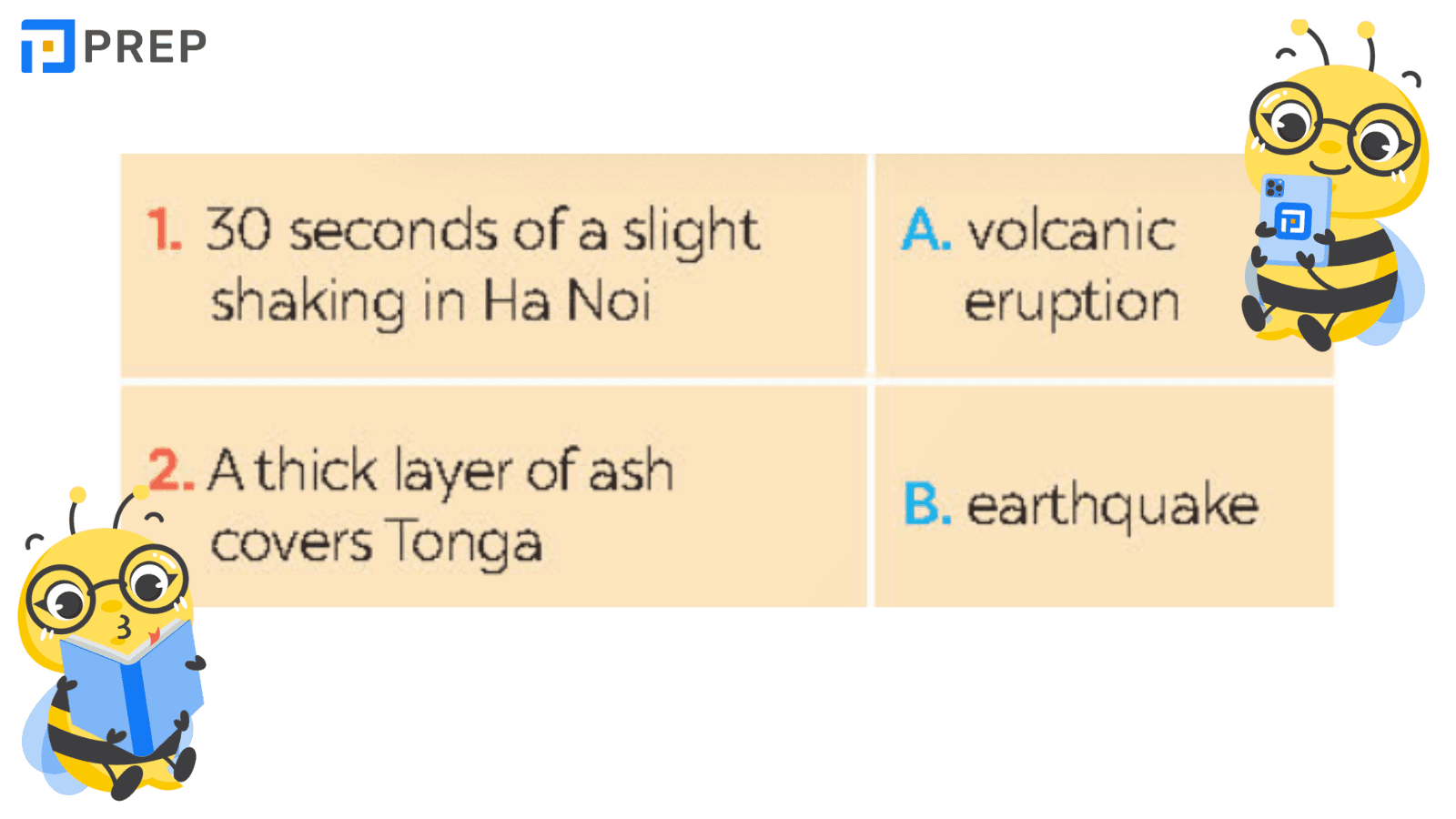
5.2. Read the two news articles
Đọc hai bài báo. Nối các từ được đánh dấu với ý nghĩa của chúng:
A volcano in the South Pacific erupted violently last Saturday. It hit Tonga, an island country in the area. The eruption sent a cloud of ash and gas into the air. People could see this cloud from 20 kilometers away. The eruption also caused a tsunami which flooded properties in Tonga’s capital. Besides, it destroyed hundreds of homes on some small islands. More than twenty people on these islands are still missing. New Zealand sent two big ships to Tonga to help the victims yesterday.
Residents in tall buildings in Ha Noi were frightened when they felt a slight shaking for about 30 seconds last night. “I was watching TV when my building started trembling. Books, lights, and other things also moved”. Ms Nguyen Ha, a resident in the Sunshine Building, shared. Many people living in the building ran out of their homes in fear. According to scientists, a strong earthquake in China caused this shaking. Luckily, there was no damage.
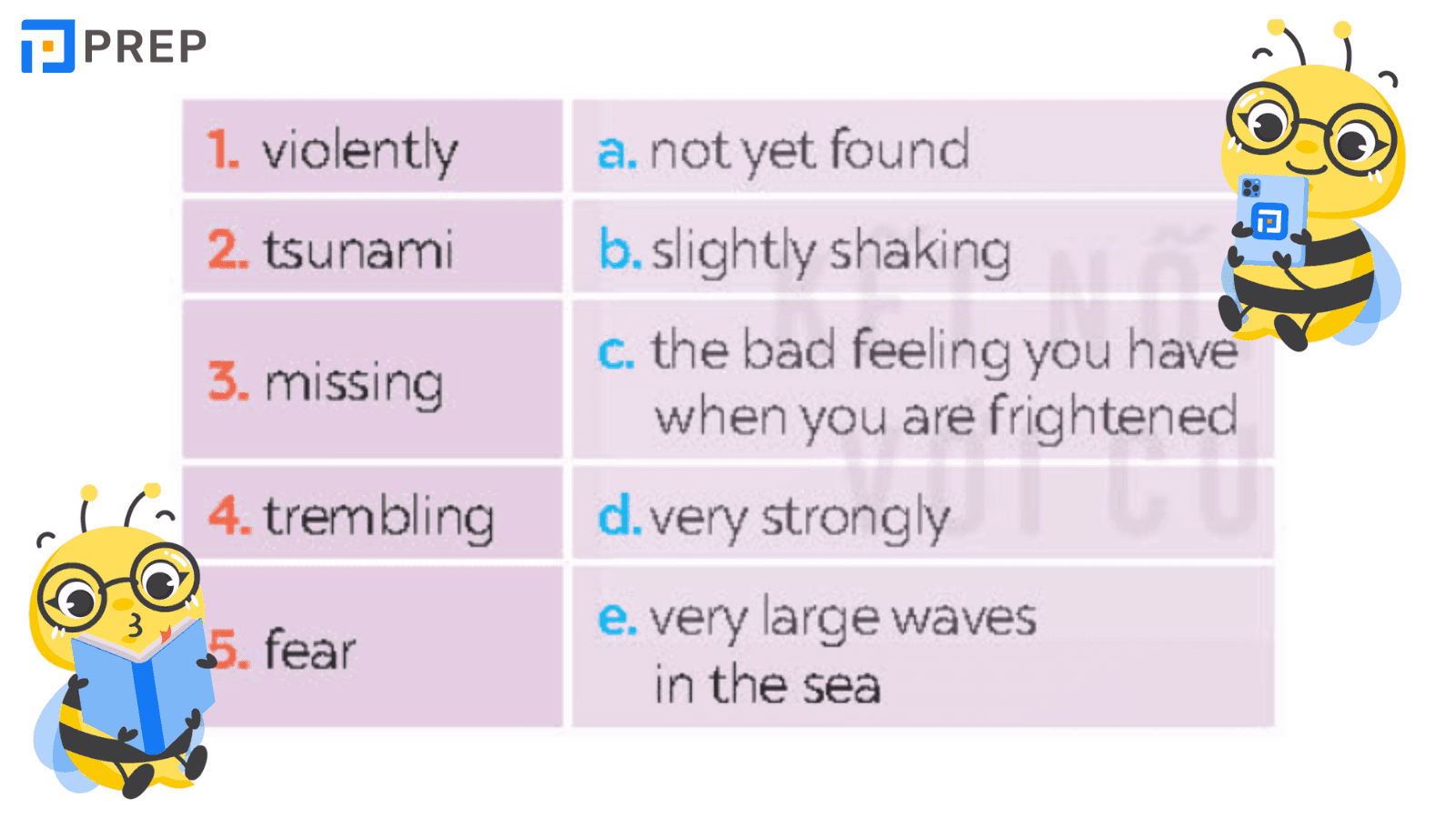
5.3. Read the articles again and answer the questions
Đọc lại bài viết và trả lời câu hỏi:
1. Where and when did the eruption happen?
2. What did the eruption cause?
3. What were the other effects of the eruption?
4. How long did the buildings shake?
5. What caused the shaking?
5.4. Work in pairs
Làm việc theo cặp. Phù hợp với câu hỏi với câu trả lời:
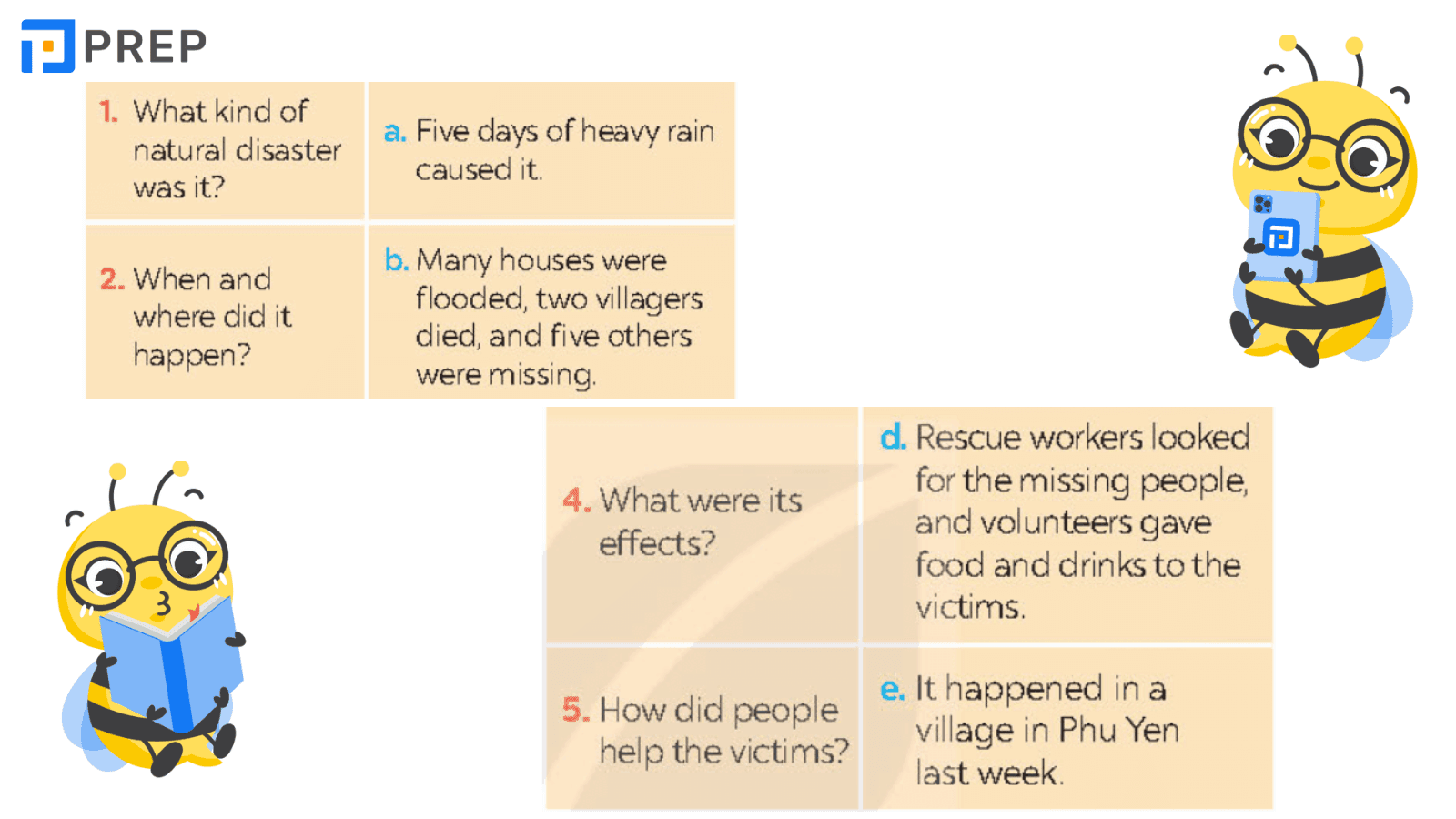
5.5. Work in groups
Làm việc nhóm. Soạn một đoạn tin ngắn về thảm họa thiên nhiên ở 4 hoặc một tin tức mà em biết. Báo cáo tin tức cho cả lớp.
6. Tiếng Anh 8 Unit 9 Skills 2
6.1. Work in pairs
Làm việc theo cặp. Nhìn vào bức tranh và trả lời các câu hỏi:
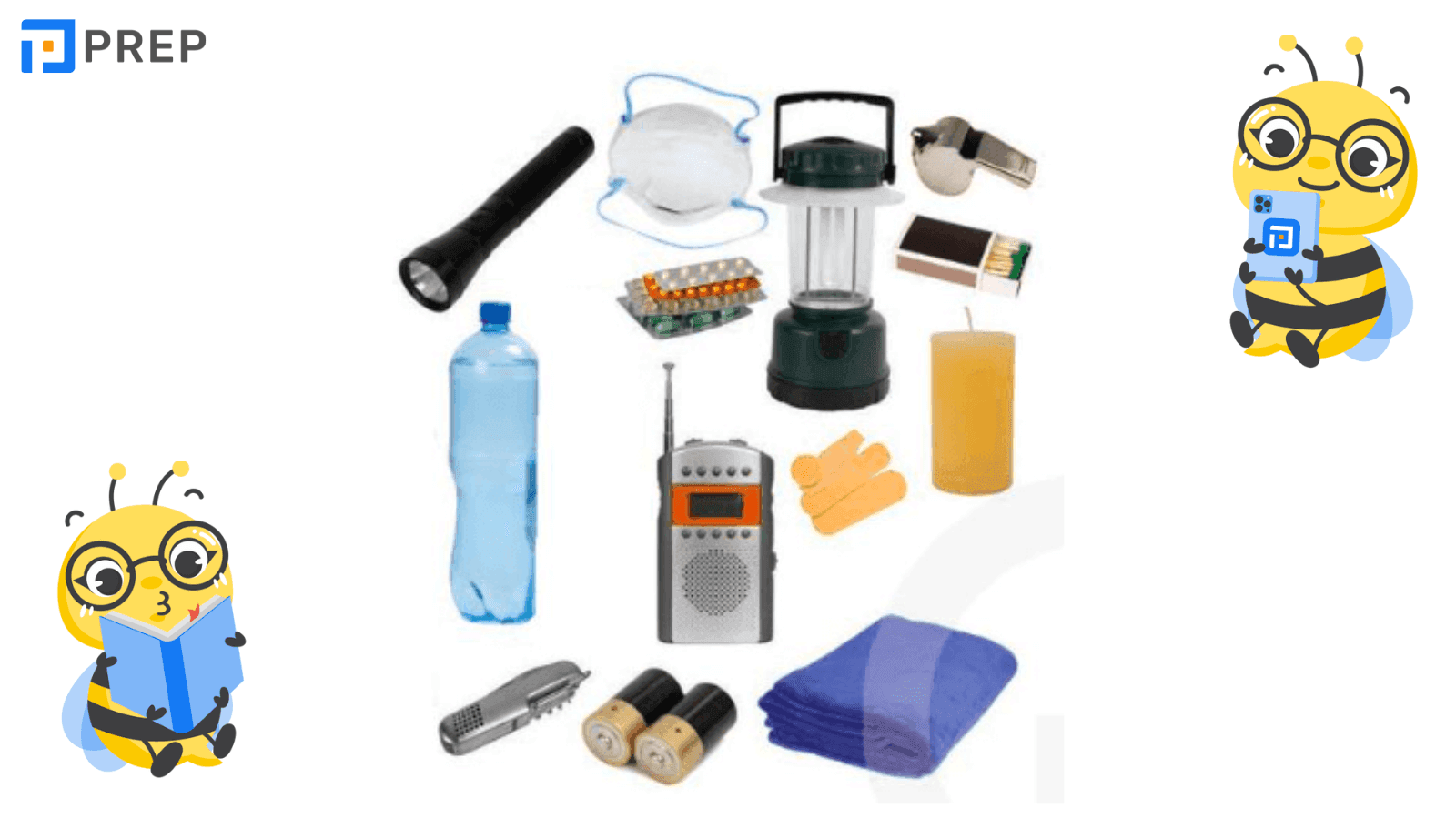
6.2. Listen to a broadcast
Nghe một chương trình phát sóng. Đặt các hoạt động (1- 6) vào đúng cột.
1. Listen to instructions from local authorities
2. Prepare an emergency kit
3. Stay inside the house
4. Keep away from dangerous areas
5. Avoid windows and glass doors
6. Strengthen houses
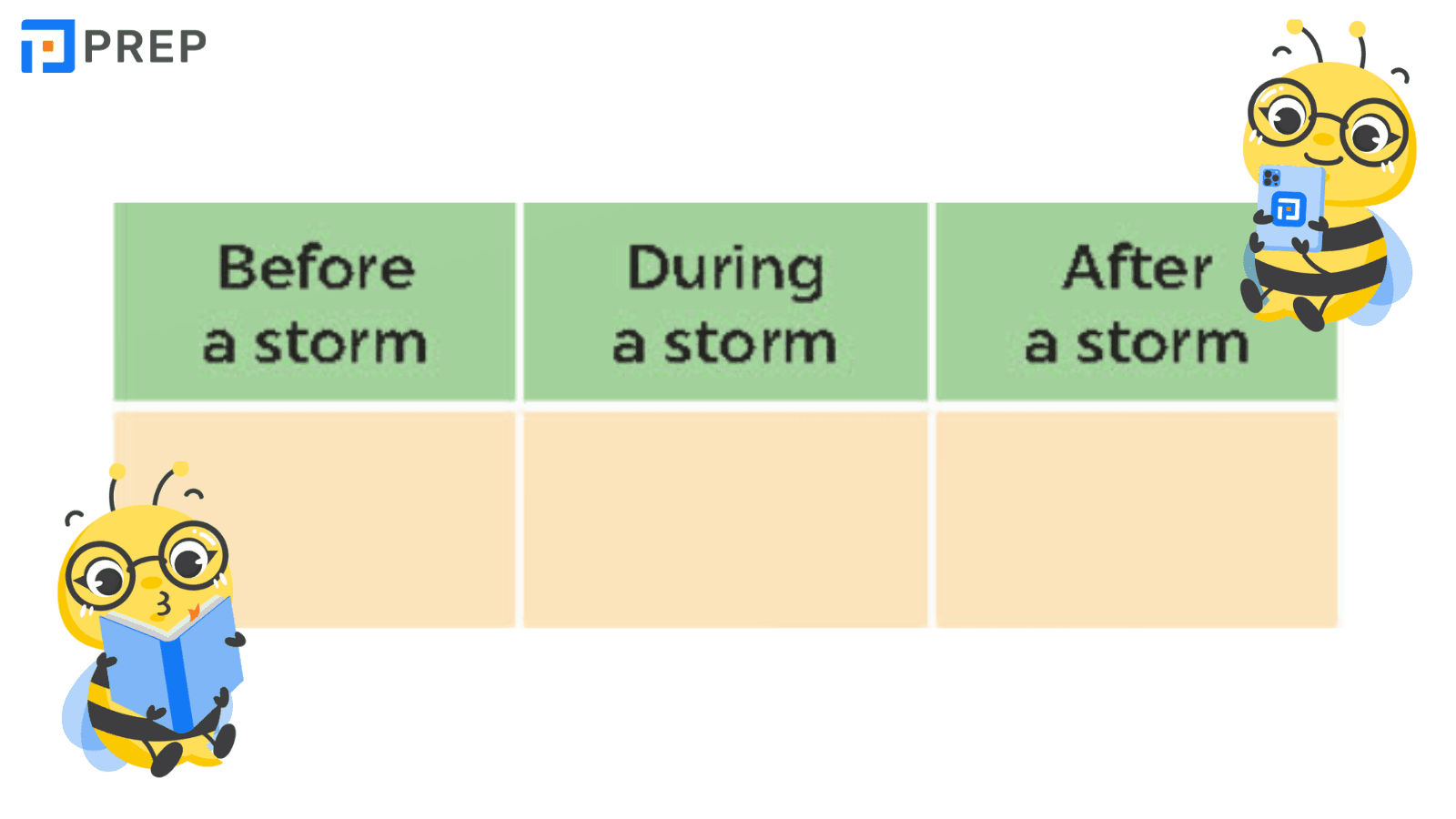
6.3. Listen again and tick (v) T (True) or F (False) for each sentence
Nghe lại và đánh dấu T (True) hoặc F (Sai) cho mỗi câu:
1. The broadcast is on TV.
2. You should bring flowerpots and rubbish bins into the house.
3. Right after the storm, you can leave your home.
4. The local authority man warn you about dangerous places.
6.4. Work in pairs
Làm việc theo cặp. Thảo luận về những gì bạn nên làm trước, trong và sau lũ lụt. Viết ý tưởng của bạn trong các cột.
6.5. Write instructions
Viết hướng dẫn (80 - 100 từ) về những việc cần làm trước, trong và sau lũ lụt.
7. Tiếng Anh 8 Unit 9 Looking Back
7.1. Write the name of a natural disaster in each blank
Viết tên của một thiên tai vào mỗi chỗ trống:
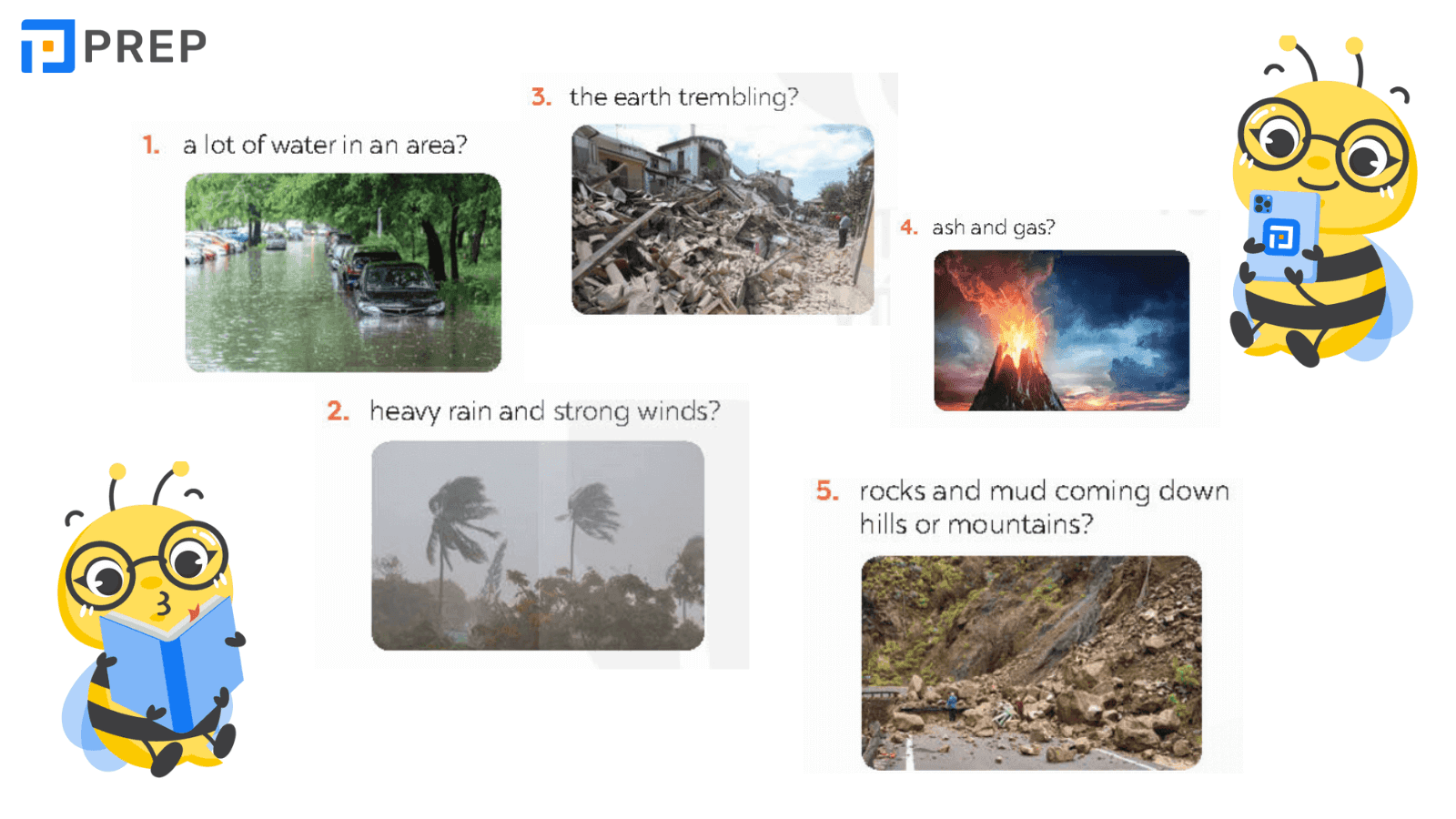
7.2. Fill in each blank with the correct form of the word in brackets
Điền vào mỗi chỗ trống dạng đúng của từ trong ngoặc:
1. The tsunami brought _________ to cities and towns near the sea. (destroy)
2. The government has developed some systems to help make _________ about natural disasters. (predict)
3. We are donating money and food to help the _____ of the landslide. (victim)
4. The local authorities _________ the villagers about a landslide yesterday. (warning)
5. Rescue _________ are trying hard to save people in the flooded area. (work)
7.3. Put the verbs into the correct tense: the past simple or past continuous
Chia động từ ở thì đúng: quá khứ đơn hoặc quá khứ tiếp diễn:
1. What ______ you (do) ______ at 8 o'clock yesterday morning?
2. Last year, earthquakes (destroy) ______ a lot of houses in Japan.
3. He (water) ______ the flowers in his garden when the tornado (come) ______.
4. While they (call) ______ for help, the rescue workers (appear) ______.
5. ______ you (listen) ______ to music at 9 o'clock yesterday evening?
7.4. Complete the sentences about you and your family members
Hoàn thành các câu về bạn và các thành viên trong gia đình bạn.
8. Tiếng Anh 8 Unit 9 Project
8.1. Choose a natural disaster you want to learn more about
Chọn một thảm họa thiên nhiên mà bạn muốn tìm hiểu thêm.
8.2. Research it. You can use these questions to guide you
Nghiên cứu nó. Bạn có thể sử dụng những câu hỏi này để hướng dẫn bạn:
-
What causes it?
-
Where and when does it usually happen?
-
What effects can it have?
-
What should people do before, during, and after it happens?
8.3. Create a poster about this natural disaster
Tạo một áp phích về thảm họa thiên nhiên này. Vẽ hình ảnh hoặc tìm hình ảnh phù hợp cho nó.
8.4. Present the poster to the class
Trình bày áp phích trước lớp.
IV. Đáp án bài tập tiếng Anh 8 Unit 9
Dưới đây PREP đã sưu tầm đáp án và lời giải gợi ý cho các bài tập trong tiếng Anh 8 Unit 9, tham khảo ngay bạn nhé!
ĐÁP ÁN BÀI TẬP TIẾNG ANH 8 UNIT 9
Trên đây PREP đã chia sẻ đầy đủ từ vựng, ngữ pháp, cấu trúc, kiến thức bài học và đáp án đi kèm trong tiếng Anh 8 Unit 9. Thường xuyên truy cập vào PREP để tham khảo thêm nhiều kiến thức tiếng Anh bổ ích bạn nhé!
Link nội dung: https://appstore.edu.vn/tieng-anh-lop-8-unit-9-skills-2-a68162.html